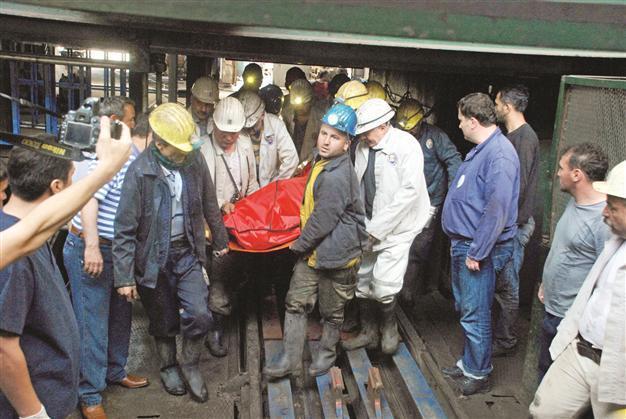Turkish Parliament OKs labor safety code
ANKARA - Hürriyet Daily News

Miners in Turkey suffer the most from the lack of occupational safety. AA photo
The Turkish Parliament approved yesterday a law on occupational health and safety just days ahead of the planned end of the parliamentary season on July 1.Parliament rushed to approve the law in the wake of a number fatal work accidents over the last few months. A worker was even killed during maintenance works in the Parliament building’s sewer system, while the bill in question was being debated in the General Assembly.
The new law divides workplaces into the following categories: “very dangerous,” “dangerous,” and “less dangerous.” Firms have to employ occupational safety specialists with an A class certificate of expertise in “very dangerous” workplaces, a B class certificate of expertise in “dangerous” workplaces, and a C class certificate in “less dangerous” workplaces.
Employers must maintain the health and security of workers with regards to their occupation and perform a risk assessment on occupational health and safety.
Labor and Social Security Minister Faruk Çelik said developed countries had enacted such regulation back in the 1970s, according to Anatolia news agency. “The regulation becomes law today although it was delayed,” he said.
The government had previously enacted laws granting collective bargaining rights to public servants and an adjustment regarding retirement pay, Çelik said, adding that occupational health and safety would cover all workers within the scope of their contract of employment.
Turkey’s bad record
Nearly 63,000 work accidents occurred in 2010 resulting in 1,444 deaths, according to work accident data for 2010 released by the Social Security Institution (SGK) at the end of 2011. More than 530 occupational illnesses were registered in that year, 10 of which led to death.
Work will be stopped if risk assessment has not been done at workplaces related to mining, metal, construction and dangerous chemicals, which all fall under the “very dangerous” category. If this happens, employers will still have to pay or find another job with the same wage for those employees who were vacated.
Another highlight of the law is that workers are entitled to avoid working until the necessary occupational health and safety precautions have been taken.
The new law also prohibits workers from coming to work drunk or holding narcotic drugs.
Employers who do not fulfill obligations outlined in the law will be fined 2,000 Turkish Liras for each of the unfulfilled obligations. Employers who do not employ a doctor or an occupational safety specialist in the workplace will be fined 5,000 liras for each specialist not assigned.
In addition, private and public national, regional and local TV channels and radios will be obliged to broadcast programs on occupational health and safety, fighting shadow employment, and social security.
Turkey is ranked as the worst in Europe and the third worst in the world when it comes to work accidents, Gürsel Tekin of the opposition Republican People’s Party (CHP) blasted in April, reacting to a series of fatal work accidents.
A whirlwind killed six workers while injuring seven others at work in the eastern province of Elazığ in April. A fire also broke out at a construction site in March in Istanbul’s Esenyurt district, killing 11 workers, while eight workers went missing in floods caused by an accident at a dam in the southern province of Adana late February.
















